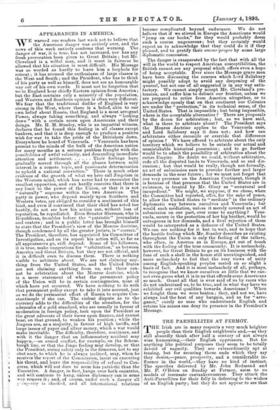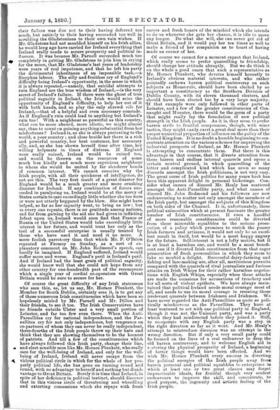THE PARNELLITES AT FERMOY. T HE Irish are in many respects
a very much brighter people than their English neighbours and,—as they still absurdly think after half a century of not always wise humouring,—their English oppressors. But for anything like political purposes they seem to be totally devoid of sagacity. They are extraordinarily apt at teasing, but for securing those ends which they say they desire,—peace, prosperity, and a considerable in- fluence in the world,—they have no kind of instinct. The speeches delivered by Mr. John Redmond and Mr. P. O'Brien on Sunday at Fermoy, seem to us models of insensate cantankerousness. They attack the Anti-Parnellites for their folly in deferring to the wishes of an Eeglish party; but they do not appear to see that their failure was due not to their having deferred too much, but entirely to their having succeeded too well in moulding the Gladstonians to their own vain wishes. If Mr. Gladstone had not moulded himself on his Irish allies, he would long ago have carried for Ireland everything that Ireland really needs to secure prosperity and political in- fluence. It was because Mr. Parnell succeeded much too 4, completely in getting Mr. Gladstone to join him in crying for the moon, that Mr. Gladstone's last years of leadership were years of real impotence, and that he left his party the detrimental inheritance of an impossible task,—a Sisyphus labour. The silly and fruitless cry of England's difficulty being Ireland's opportunity, in the sense in which it is always repeated,—namely, that suicidal attempts to ruin England are the true wisdom of Ireland,—is the very secret of Ireland's failure. If there were the ghost of true political sagacity in Ireland, the Irish would seize the opportunity of England's difficulty, to help her out of it with both hands, and so play the only shrewd role for Ireland,—that of a helpful and even necessary comrade. As if England's ruin could lead to anything but Ireland's ruin too ! With a neighbour so powerful as this country, what can be more absurd, more idiotic, we might almost say, than to count on gaining anything substantial from her misfortunes ? Ireland is, as she is always protesting to the world, a poor country ; and close beside her there is a rich and powerful country, her best customer, her necessary ally, and, as she has shown herself time after time, her willing helpmate in times of distress. If England were really ruined, Ireland would be ruined too, and would be thrown on the resources of some much less kindly and much more capricious neighbour to whom she would be united by far slenderer bonds 3f common interest. We cannot conceive why the Irish people, with all their quickness of intelligence, do not see this. The very first result of a great disaster for England would be a much greater and more crushing disaster for Ireland. If any combination of forces suc- ceeded in paralysing us, Ireland would be at the mercy of States certain to care exceedingly little whether she too were ar were not utterly beggared by the blow. She might have helped, so far as her capacity went, to bring us low ; but is every one repeats, there is no gratitude among nations, Ind far from gaining by the aid she had given in inflicting lefeat upon us, Ireland would soon find that France or Russia or the United States would take exceedingly little interest in her future, and would treat her only as the tool of a successful enterprise is usually treated by those who have used it and need it no more. A more foolish parrot-cry than that which Mr. P. O'Brien repeated at Fermoy on Sunday, as a sort of ex- planatory comment on Mr. John Redmond's speech, can hardly be imagined. If England suffered, Ireland would suffer more and worse. England's peril is Ireland's peril. And if Ireland had the least grain of political sagacity, she would know well that she could not hope from any other country for one-hundredth part of the recompense which a single year of cordial co-operation with Great Britain would be sure to secure for her.
Of course the great difficulty of any Irish statesman who sees this, as, let us say, Mr. Horace Plunkett, the Member for South Dublin, certainly sees it, is to get any of those numerous Irish constituencies which have been so hopelessly raided by Mr. Parnell and Mr. Dillon and their friends, to see it too. The Irish Conservatives have no friends outside Ulster and a very small portion of Leinster, and far too few even there. When the Anti- Parnellites cry for national independence, and the Par- nellites cry for not only independence, but vengeance on co-partners of whom they can never be really independent, three-fourths of the Irish people throw up their hats and think that they are showing themselves to be the keenest of patriots. And till a few of the constituencies which have always followed this Irish party, change their line, a and elect sensible men like Mr. Horace Plunkett, who really care for the well-being of Ireland, and only for the well- being of Ireland, Ireland will never escape from the 4 vicious political circle in which for the whole of her pro- perly political life, she has gone on turning round and round, with no advantage to herself and nothing but disad- vantage to Great Britain. Surely it is time that Ireland, in spite of her deficiency in political instinct, should discover that in this vicious circle of threatening and wheedling and extorting concessions which she repays with fresh sneers and fresh boasts of the mischief which she intends to do us whenever she gets her chance, it is idle to move any longer. Do what she will, she can never get rid of Great Britain, and it would pay her ten times as well to make a friend of her companion as to boast of having made an enemy of her.
Of course we cannot for a moment expect that Ireland, which really seems to prefer quarrelling to friendship, should change her attitude abruptly. But we do think it on the whole a good omen that such a representative as Mr. Horace Plunkett, who devotes himself honestly to Ireland's obvious material interests, and who rather pointedly eschews barren political controversy on such subjects as Home-rule, should have been elected by so important a constituency as the Southern Division of Dublin County, with its eleven thousand electors, and should have been elected too by a very large majority. 'If that example were only followed in other parts of Leinster, and a few of the greater constituencies of Con- naught and Munster, there would be the germ of a party that might really lay the foundation of new political strength in the Irish people. As it is, they seem to prefer barren strife to fruitful compromise, though, with wiser tactics, they might easily exert a great deal more than their proper numerical proportion of influence on the policy of the United Kingdom. It is no doubt a humble beginning to con- centrate attention on the various schemes for improving the industrial prospects of Ireland, as Mr. Horace Plunkett is attempting to concentrate them. But there is this advantage in that course, that it diverts attention from these barren and endless internal quarrels and opens a certain neutral ground, in which quarrelling of the bitter and complicated kind which has sown so many discords amongst the Irish politicians, is not very easy. The great curse of Irish politics for many years back has been this apparent delight in personal bickerings. Con- sider what causes of discord Mr. Healy has scattered amongst the Anti-Parnellite party, and what causes of discord Mr. John Redmond and his followers are now endeavouring to scatter not only amongst the members of the Irish party, but amongst the subjects of this Kingdom on both sides of the Channel. It is, unfortunately, these political animosities which at present fascinate the greater number of Irish constituencies. If even a handful of more reasonable constituencies could be diverted from these miserable squabbles to the serious prose- cution of a policy which promises to enrich the poorer Irish farmers and artisans, it would not only be an excel- lent result in itself, but would be a most happy augury for the future. Self-interest is not a lofty motive, but it is at least a harmless one, and would be a most benefi- cent one if it diverted Irish constituencies from that eager prosecution of fresh personalities in which they seem to take so morbid a delight. Successful dairy-farming and fishing and lace-making are, after all, meritorious pursuits compared with the quarrels of rival journalists and furious attacks on Irish Whips for their rather harmless negotia- tions with English Whips, especially when these attacks are made the occasions for accusations of treachery and for all sorts of violent epithets. We have always main- tained that political Ireland needs moral courage most of all, and needs to use its moral courage in resisting these irrelevant quarrels between Irishmen and Irishmen. We have never regarded the Anti-Parnellites as quite so poli- tically mischievous as the Parnellites. They have at least ventured to act with one political party in England, though it was not the Unionist party, and was a party which they had misdirected before they joined it. Still, to co-operate with any English party was a step in the right direction so far as it went. And Mr. Healy's attempt to reintroduce disunion was an attempt in the wrong direction. But if only a very small party could be formed on the lines of a real endeavour to drop the old barren controversy, and to welcome English aid in restoring the physical prosperity of Ireland, a beginning of better things would have been effected. And we wish Mr. Horace Plunkett every success in diverting the political energies of the Irish people away from barren personal and political squabbles to enterprises Ai which at least one or two great classes may forget impracticable ideals, for fruitful though very modest endeavours to improve the skill, and concentrate, to good purpose, the ingenuity and artistic feeling of the Irish people.















































 Previous page
Previous page